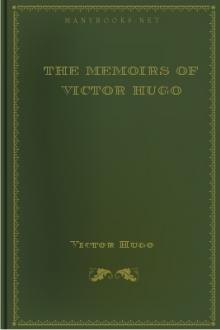Hilda Lessways by Arnold Bennett (some good books to read txt) 📕

- Author: Arnold Bennett
Book online «Hilda Lessways by Arnold Bennett (some good books to read txt) 📕». Author Arnold Bennett
"I used to work here," said Edwin Clayhanger.
She inquired about the work.
"Well," he drawled, "reading and writing, you know--at that very table."
In the aperture of the window, amid piles of paper, stood a rickety old table, covered with dust.
"But there's no fireplace," she said, glancing round the room, and then directly at him.
"I know."
"But how did you do in winter?" she eagerly appealed.
And he replied shortly, and with a slight charming affectation of pride: "I did without."
Her throat tightened, and she could feel the tears suddenly swim in her eyes. She was not touched by the vision of his hardships. It was the thought of all his youth that exquisitely saddened her--or all the years which were and would be for ever hidden from her. She knew that she alone of all human beings was gifted with the power to understand and fully sympathize with him. And so she grieved over the long wilderness of time during which he had been uncomprehended. She wanted, by some immense effort of tenderness, to recompense him for all that he had suffered. And she had a divine curiosity concerning the whole of his past life. She had never had this curiosity in relation to George Cannon--she had only wondered about his affairs with other women. Nor had George Cannon ever evoked the tenderness which sprang up in her from some secret and inexhaustible source at the mere sight of Edwin Clayhanger's wistful smile. Still, in that moment, standing close to Edwin in the high solitude of the shadowed attic, the souvenir of George Cannon gripped her painfully. She thought: "He loves me, and he is ruined, and he will never see me again! And I am here, bursting with hope renewed, and dizzy with joy!" And she pictured Janet, too, wearying herself at a committee meeting. And she thought, "And here am I...!" Her bliss was tragic.
"I think I ought to be going," she said softly.
They re-threaded the corridors, and in each lower room, as they passed, Edwin Clayhanger extinguished the gas which he had lit there on the way up, and Hilda waited for him. And then they were back in the crude glare of the shop. The fat, untidy old man was not visible. Edwin helped her with the mackintosh, and she liked him for the awkwardness of his efforts in doing so.
At the door, she urged him not to come out, and referred to his cold.
"This isn't the end of winter, it's the beginning," she warned him. Nobody else, she knew, would watch over him.
But he insisted on coming out.
They arranged a rendezvous for three o'clock on the morrow, and then they shook hands.
"Now, do go in," she entreated, as she hurried away. The rain had ceased. She fled triumphantly up Trafalgar Road, with her secret, guarding it. "He's in love with me!" If a scientific truth is a statement of which the contrary is inconceivable, then it was a scientific truth for her that she and Edwin must come together. She simply would not and could not conceive the future without him.... And this so soon, so precipitately soon, after her misfortune! But it was her very misfortune which pushed her violently forward. Her life had been convulsed and overthrown by the hazard of destiny, and she could have no peace now until she had repaired and re-established it. At no matter what risk, the thing must be accomplished quickly... quickly.
CHAPTER IV THE CALL FROM BRIGHTON
I
On the next afternoon, at a quarter-past two, Hilda and Janet were sitting together in the breakfast-room. The house was still. The men were either theoretically or practically at business. Alicia was at school. Mrs. Orgreave lay upstairs. The servants had cleared away and washed up the dinner-things, and had dined themselves. The kitchen had been cleansed and put in order, and every fire replenished. Two of the servants were in their own chambers, enfranchised for an hour: one only remained on duty. All six women had the feeling, which comes to most women at a certain moment in each day, that life had, for a time, deteriorated into the purposeless and the futile; and that it waited, as in a trance, until some external masculine event, expected or unforeseen, should renew its virtue and its energy.
Hilda was in half a mind to tell Janet the history of the past year. She had wakened up in the night, and perceived with dreadful clearness that trouble lay in front of her. The relations between herself and Edwin Clayhanger were developing with the most dizzy rapidity, and in a direction which she desired, but it would be impossible for her, if she fostered the relations, to continue to keep Edwin in ignorance of the fact that, having been known for about a fortnight as Mrs. George Cannon, she was not what he supposed her to be. With imagination on fire, she was anticipating the rendezvous at three o'clock. She reached forward to it in ecstasy; but she might not enjoy it, save at the price which her conscience exacted. She had to say to Edwin Clayhanger that she had been the victim of a bigamist. Could she say it to him? She had not been able to say it even to Janet Orgreave.... She would say it first to Janet. There, in the breakfast-room, she would say it. If it killed her to say it, she would say it. She must at any cost be able to respect herself, and, as matters stood, she could not respect herself.
Janet, on her knees, was idly arranging books on one of the lower bookshelves. In sheer nervousness, Hilda also dropped to her knees on the hearthrug, and began to worry the fire with the poker.
"I say, Janet," she began.
"Yes?" Janet did not look up.
Hilda, her heart beating, thought, with affrighted swiftness: "Why should I tell her? It is no business of anybody's except _his_. I will tell him, and him alone, and then act according to his wishes. After all, I am not to blame. I am quite innocent. But I won't tell him to-day. Not to-day! I must be more sure. It would be ridiculous to tell him to-day. If I told him it would be almost like inviting a proposal! But when the proper time comes,--then I will tell him, and he will understand! He is bound to understand perfectly. He's in love with me."
She dared not tell Janet. In that abode of joyful and successful propriety the words would not form themselves. And the argument that she was not to blame carried no weight whatever. She--she, Hilda--lacked courage to be candid.... This was extremely disconcerting to her self-esteem.... And even with Edwin Clayhanger she wished to temporize. She longed for nothing so much as to see him; and yet she feared to meet him.
"Yes?" Janet repeated.
A bell rang faintly in the distance of the house.
Hilda, suddenly choosing a course, said: "I forgot to tell you. I'm supposed to be going down to Clayhanger's at three to see a machine at work--it was too late last night. Do come with me. I hate going by myself." It was true: in that instant she did hate going by herself. She thought, knowing Janet to be at liberty and never dreaming that she would refuse: "I am saved--for the present."
But Janet answered self-consciously:
"I don't think I must leave mother. You'll be perfectly all right by yourself."
Hilda impetuously turned her head; their glances met for an instant, in suspicion, challenge, animosity. They had an immense mutual admiration the one for the other, these two; and yet now they were estranged. Esteem was nullified by instinct. Hilda thought with positive savagery: "It's all fiddlesticks about not leaving her mother! She's simply on her high horse!" The whole colour of existence was changed.
II
Martha entered the room. Neither of the girls moved. Beneath the deferential servant in Martha was a human girl, making a third in the room, who familiarly divined the moods of the other two and judged them as an equal; and the other two knew it, and therefore did not trouble to be spectacular in front of her.
"A letter, miss," said Martha, approaching Hilda. "The old postman says it was insufficiently addressed, or it 'ud ha' been here by first post."
"Was that the postman who rang just now?" asked Janet.
"Yes, miss."
Hilda took the letter with apprehension, as she recognized the down-slanting calligraphy of Sarah Gailey. Yes, the address was imperfect--"Miss Lessways, c/o Osmond Orgreave, Esq., Lane End House, Knype-on-Trent," instead of "Bursley, Knype-on-Trent." On the back of the envelope had been written in pencil by an official, "Try Bursley." Sarah Gailey could not now be trusted to address an envelope correctly. The mere handwriting seemed to announce misfortune.
"From poor Sarah," Hilda murmured, with false, good-tempered tranquillity. "I wonder what sort of trouble she thinks she's got into!"
She thought: "If only I was married, I should be free of responsibility about Sarah. I should have to think of my husband first. But nothing else can free me. Unless I marry, I'm tied to Sarah Gailey as long as she lives.... And why?... I should like to know!" The answer was simple: habit had shackled her to Sarah Gailey.
She opened the letter by the flickering firelight, which was stronger on the hearthrug than the light of the dim November day. It began: "Dearest Hilda, I write at once to tell you that a lawyer called here this afternoon to inquire about your Hotel Continental shares. He told me there was going to be some difficulty with the Company, and, unless the independent shareholders formed a strong local committee to look after things, the trouble might be serious. He wanted to know if you would support a committee at the meeting. I gave him your address, and he's going to write to you. But I thought I would write to you as well. His name is Eustace Broughton, 124 East Street, in case. I do hope nothing will go wrong. It is like what must be, I am sure! It has been impossible for me to keep the charwoman. So I sent her off this morning. Can you remember the address of that Mrs. Catkin?..." Sarah Gailey continued to discuss boarding-house affairs, until she arrived at the end of the fourth page, and then, in a few cramped words, she finished with expressions of love.
"Oh dear!" Hilda exclaimed, rising, "I must write some letters at once." She sighed, as if in tedium. The fact that her fortune was vaguely threatened did not cause her anxiety: she scarcely realized it. What she saw was an opportunity to evade the immediate meeting with Edwin--the meeting which, a few minutes earlier, she had desired beyond everything.
"When? Now?"
Hilda nodded.
"But what about Master Edwin?" Janet asked, trying to be gay.
"I shan't be able to go," said Hilda carelessly, at the door. "It's of no consequence."
"Martha has to go down town. If you like, she could call in there, and just tell him."
It was a reproof, from the young woman who always so thoughtfully studied





Comments (0)